牛津译林版七年级下 Unit8 Pets Grammar课件(共51张PPT)
文档属性
| 名称 | 牛津译林版七年级下 Unit8 Pets Grammar课件(共51张PPT) | 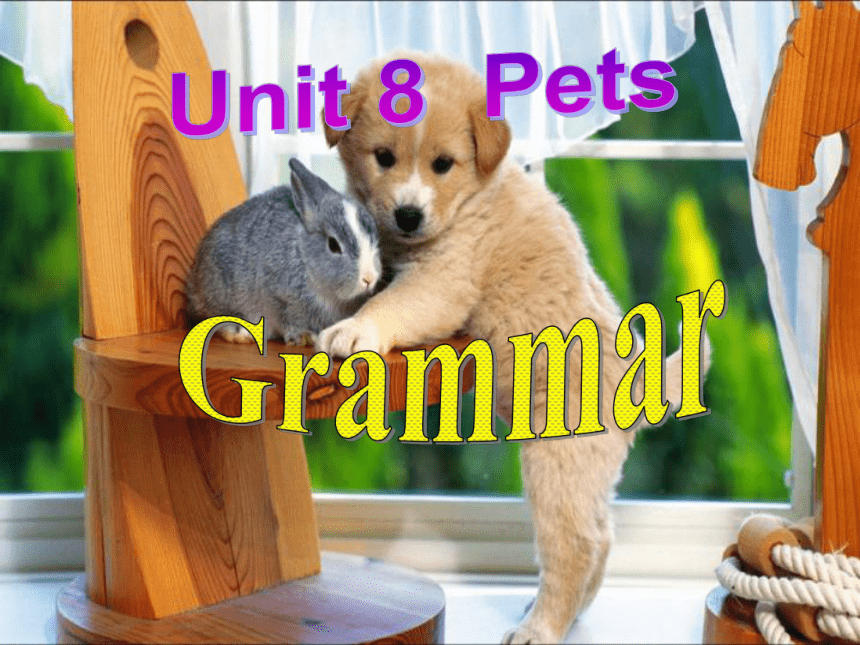 | |
| 格式 | ppt | ||
| 文件大小 | 2.3MB | ||
| 资源类型 | 教案 | ||
| 版本资源 | 牛津译林版 | ||
| 科目 | 英语 | ||
| 更新时间 | 2020-06-23 13:38:13 | ||
图片预览

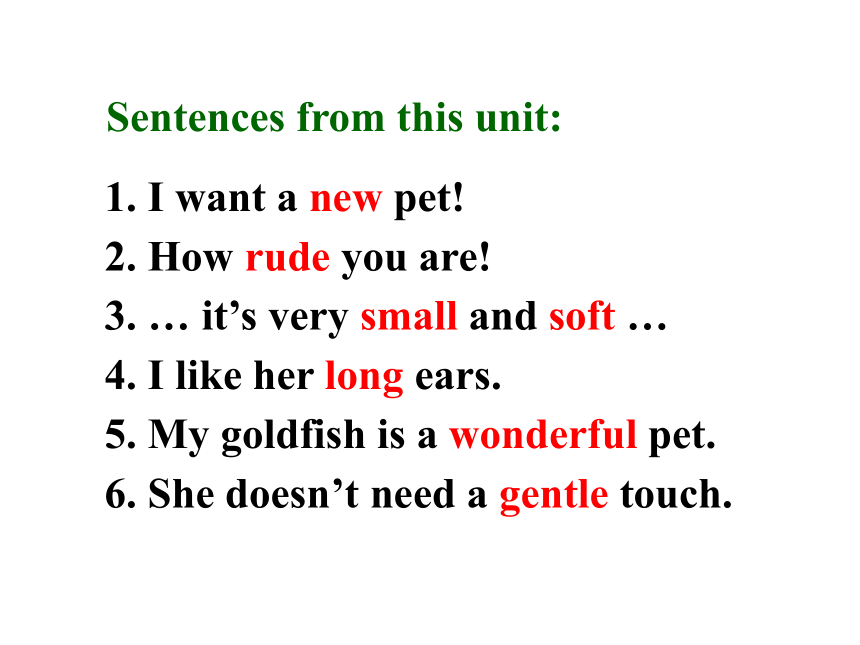
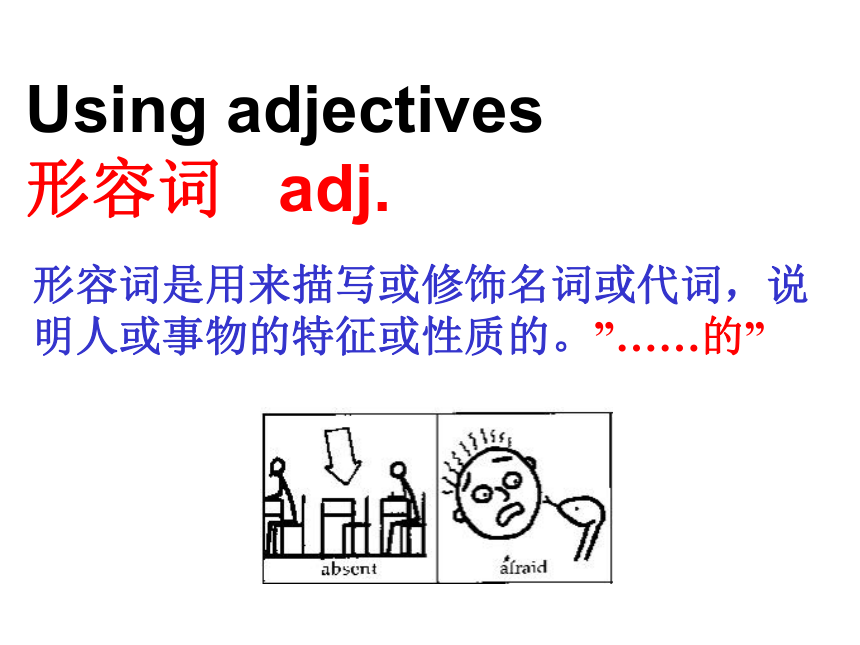
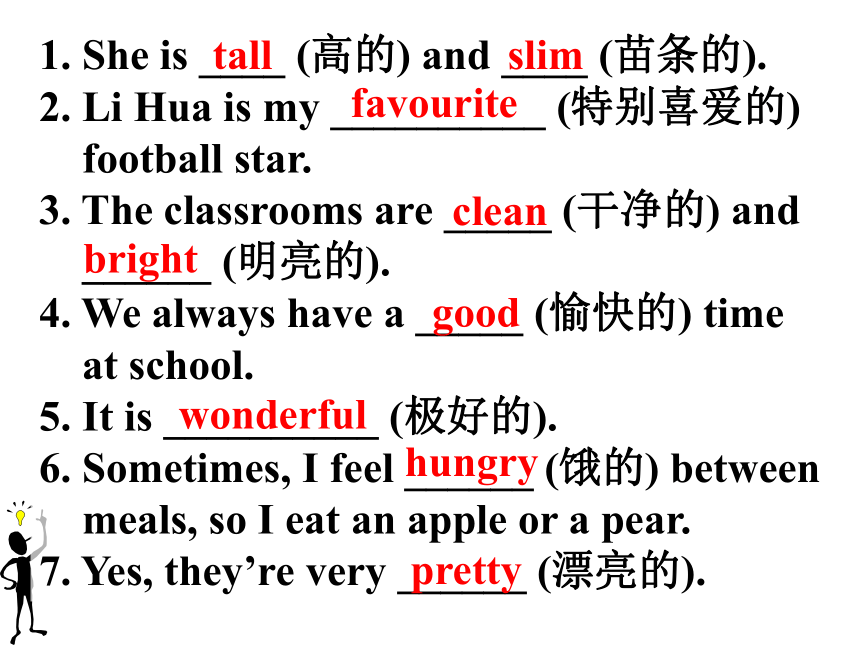

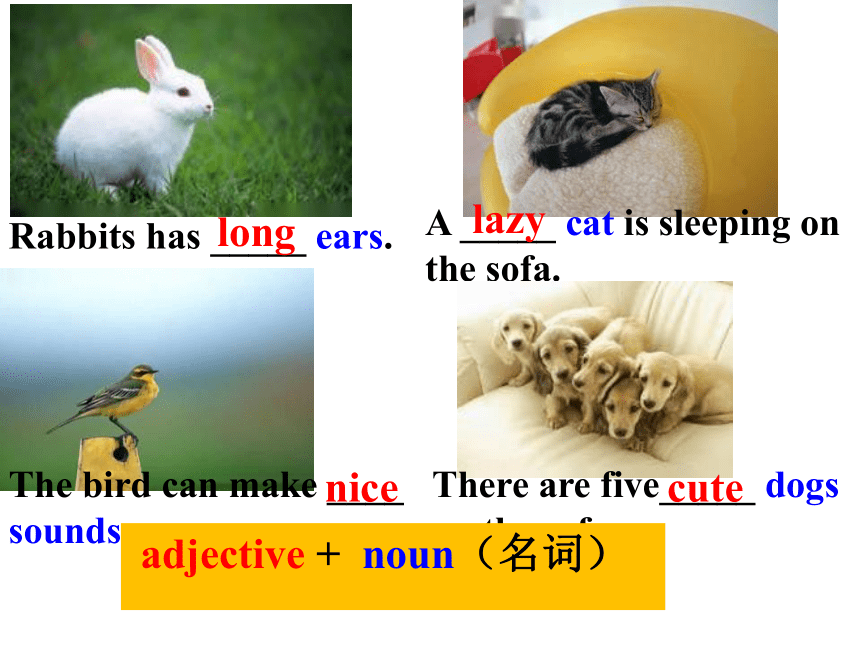
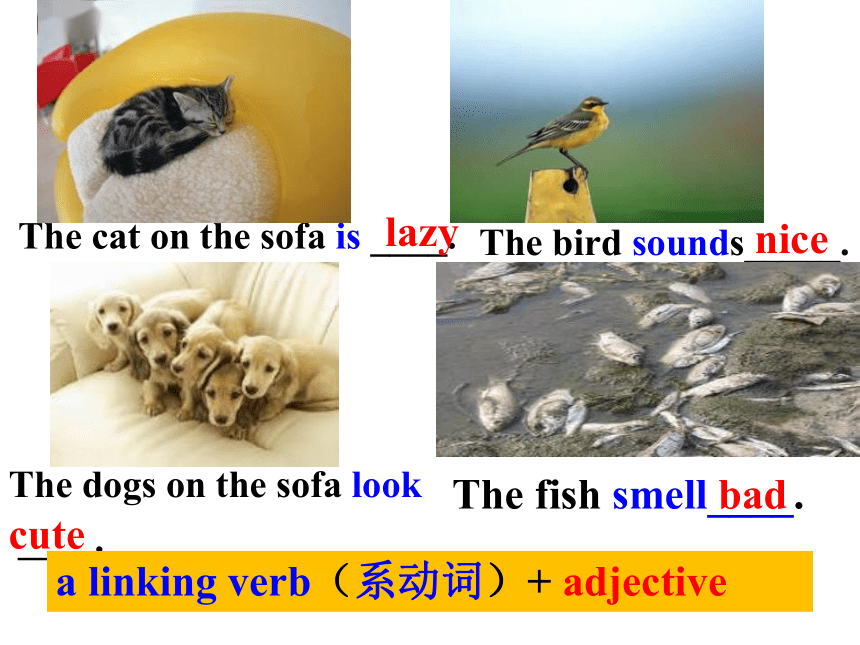
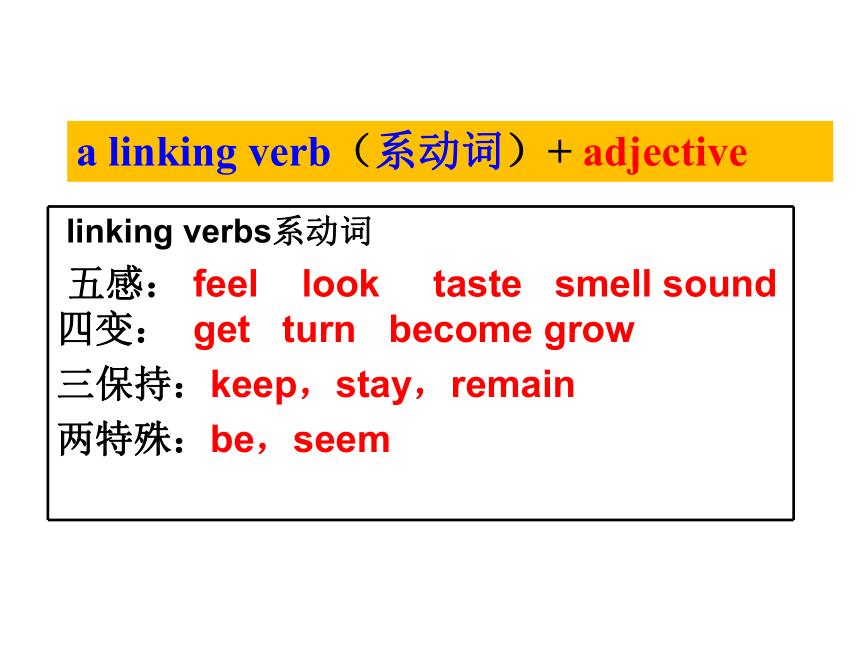
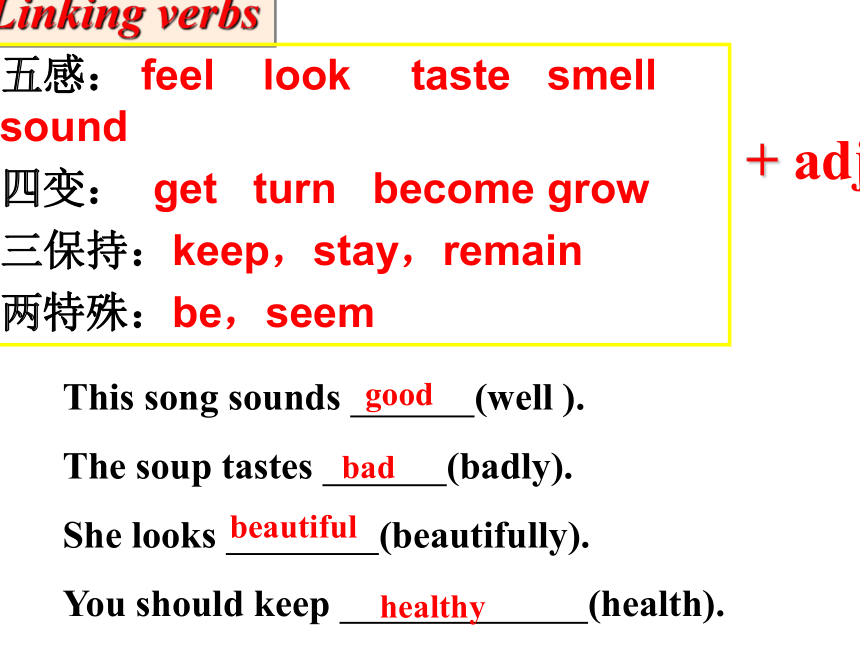
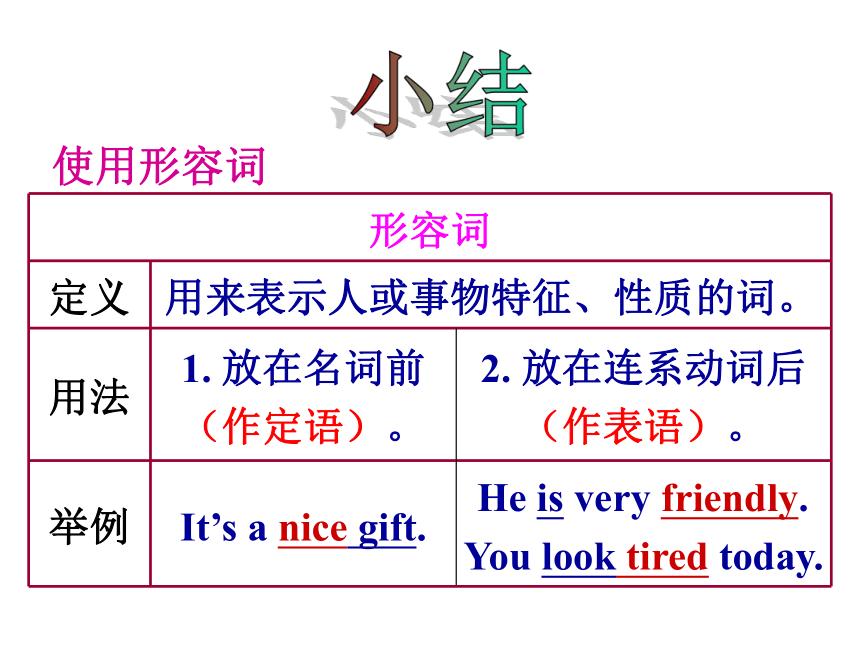
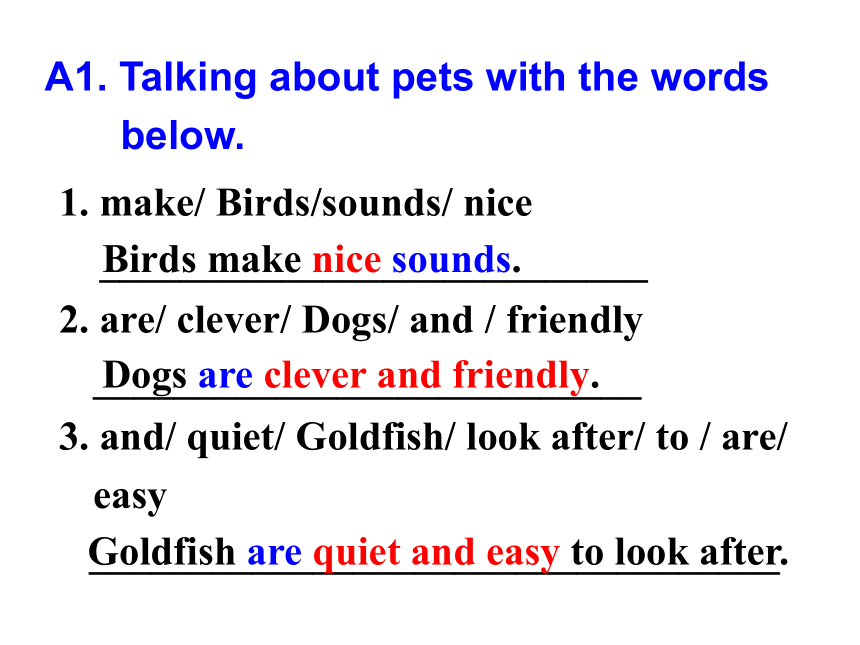
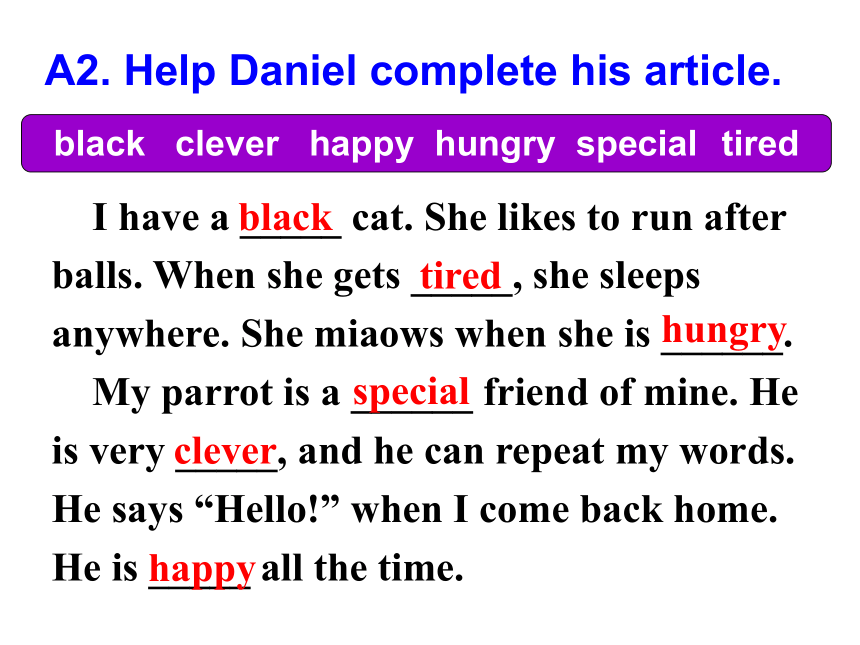
文档简介
(共50张PPT)
Sentences from this unit:
1. I want a new pet!
2. How rude you are!
3. … it’s very small and soft …
4. I like her long ears.
5. My goldfish is a wonderful pet.
6. She doesn’t need a gentle touch.
Using adjectives
形容词 adj.
形容词是用来描写或修饰名词或代词,说明人或事物的特征或性质的。”……的”
1. She is ____ (高的) and ____ (苗条的).
2. Li Hua is my __________ (特别喜爱的)
football star.
3. The classrooms are _____ (干净的) and
______ (明亮的).
4. We always have a _____ (愉快的) time
at school.
5. It is __________ (极好的).
6. Sometimes, I feel ______ (饿的) between
meals, so I eat an apple or a pear.
7. Yes, they’re very ______ (漂亮的).
tall
slim
favourite
clean
bright
good
wonderful
hungry
pretty
8. He looks ______ (精干的).
9. They are _____ (和蔼的) and _______
(愿意帮忙的).
10. The air is ______ (新鲜的) here.
11. I want a ____ (新的) pet!
12. How _____ (粗鲁的) you are!
13. … it’s very _____ (小的) and ____ (柔软
的) …
14. I like her _____ (长的) ears.
15. My goldfish is a _________ (极好的) pet.
16. She doesn’t need a _____ (温柔的) touch.
smart
kind
helpful
fresh
new
rude
small
soft
long
wonderful
gentle
Rabbits has _____ ears.
A _____ cat is sleeping on the sofa.
The bird can make ____
sounds.
nice
There are five_____ dogs on the sofa.
cute
lazy
adjective + noun(名词)
long
The cat on the sofa is ____.
lazy
The bird sounds_____.
nice
The dogs on the sofa look
____.
cute
The fish smell____.
a linking verb(系动词)+ adjective
bad
linking verbs系动词
五感: feel look taste smell sound 四变: get turn become grow
三保持:keep,stay,remain
两特殊:be,seem
a linking verb(系动词)+ adjective
Linking verbs
五感: feel look taste smell sound
四变: get turn become grow
三保持:keep,stay,remain
两特殊:be,seem
+ adj
This song sounds (well ).
The soup tastes (badly).
She looks (beautifully).
You should keep (health).
bad
good
beautiful
healthy
形容词
定义 用来表示人或事物特征、性质的词。
用法 1. 放在名词前(作定语)。 2. 放在连系动词后(作表语)。
举例 It’s a nice gift. He is very friendly.
You look tired today.
使用形容词
1. make/ Birds/sounds/ nice
___________________________
2. are/ clever/ Dogs/ and / friendly ___________________________
3. and/ quiet/ Goldfish/ look after/ to / are/ easy
__________________________________
Birds make nice sounds.
Dogs are clever and friendly.
Goldfish are quiet and easy to look after.
A1. Talking about pets with the words below.
I have a _____ cat. She likes to run after balls. When she gets _____, she sleeps anywhere. She miaows when she is ______.
My parrot is a ______ friend of mine. He is very _____, and he can repeat my words. He says “Hello!” when I come back home. He is _____ all the time.
black
black clever happy hungry special tired
tired
hungry
special
clever
happy
A2. Help Daniel complete his article.
2种特殊的形容词
interesting , interested
I am very ________ in this ________ book.
surprising , surprised
Mary is very _______ to hear the ________ news.
amazing , amazed
We are so _______ to know that the world is full of ____ things.
exciting , excited
They feel so ______ to watch the ______ match.
-ing 令人...的
-ed 感到...的
interested
interesting
surprised
interesting
amazed
amazing
excited
exciting
good & well
We are _________ students.
He plays football very _________.
The food tastes _________.
The flowers smell ___________.
Ants can smell things ___________.
I am not feeling _________ these days.
Is your grandmother __________ now?
well adj. 身体好的
adv.
good adj.
good
well
good
good
well
well
well
Look at the following sentences.
1. Hello, everyone! (七年级上册 U1)
2. I can tell something about Millie and
her classmates. (七年级上册 U1)
3. … she’s going to ask someone to fix it.
(七年级下册 U2)
4. Can you find anyone to help you with
your homework (七年级下册 U2)
5. There’s something wrong with my
computer. (七年级下册 U2)
6. Is there anything wrong with your
fridge (七年级下册 U2)
7. Hi, everybody! (七年级下册 U4)
8. They turned around but saw nothing.
“Is anybody there ” Millie asked.
Nobody replied. (七年级下册 U5)
9. Then she told Andy everything.
(七年级下册 U5)
当我们不知道或没有必要说明所谈论的人是谁或是什么事物时,我们就用不定代词来指代人或物。
B. Indefinite pronouns (不定代词)
★ We use indefinite pronouns to refer to people and things when we do not know or do not need to mention who or what we are talking about.
指人 somebody/someone anybody/ anyone nobody/ no one everybody/ everyone
指物 something anything nothing everything
用法 用肯定句以及表示期待对方给予肯定回答的问句中。 用于否定句、疑问句以及表示强调的肯定句中。 在句中用来表示否定,相当于not any- 表示所有的人或物。
备注 1. 所有不定代作主语时谓语动词用单数形式
2. 形容词修饰不定代词时,形容词要后置。
不定代词:用来指不定数量或范围的人或物(单数)
I saw ___________________ (有人) in the house.
How to use indefinite pronouns
somebody (=someone)
There is ____________ (某个东西)under the bed.
something
We use somebody, someone and something in positive sentences.
When we are offering something or when we expect the answer to be ‘yes’, we can use something, somebody/ someone in questions.
Would you like something to eat
Is someone there
I did not see _________________(有人)in the house.
anybody (=anyone)
There is not ________(某个东西)under the bed.
anything
We use anybody, anyone and anything in negative sentences or in questions.
Do you feed your goldfish ________(某物)else?
anything
There is ________________(没人)in the living room.
nobody (= no one)
I saw _______(没东西)in the fridge.
nothing
We use nobody, no one and nothing to refer to ‘not anyone’ and ‘not anything’.
There isn’t anybody in the room.
= There is _____________ in the room.
I did not hear anything. = I heard _______.
nobody/no one
nothing
Is _________________ (每个人) here today
__________ (每样东西) is ready.
everybody/everyone
Everything
We use everybody, everyone and everything to refer to ‘all people’ and ‘all things’.
Mr Hu is asking the students about their plete their conversation with the correct indefinite pronouns.
Mr Wu: Millie, I know you have a dog. What do you feed him
Millie: We usually give him dog food.
Mr Wu: Do you feed him ________ else
Millie: Yes. Sometimes we give him some meat. He likes it.
Mr Wu: I see. Does ________________ have a cat
Amy: Yes, I have a cat. She’s nice to _____________________.
Mr Wu: Good. I know _________________ has goldfish, right
anything
anyone (anybody)
everybody (everyone)
somebody (someone)
Peter: Yes, I do. Goldfish are easy to look after.
Mr Wu: That’s true. Does ______________ have a snake
Kitty: No. _______________ wants a snake, I think.
Daniel: I don’t agree. There’s _______ wrong with keeping a snake if you like it.
nothing
anyone (anybody)
Nobody (no one)
用不定代词填空
---What a big box! Can I help you --- No, thanks. There’s _______ in it.
It’s empty(空的).
nothing
3. --- There’s _________ wrong with my clock. It doesn’t work. --- Don’t worry. Let me have a look.
4. --- _____________ is in the classroom.
Where are they --- They are all on the playground.
5. --- How easy the maths exam was! --- Yes. But I don’t think ________
could pass it.
something
No one/Nobody
everyone
注:
★1. 形容词修饰复合不定代词时,通常要位于不定代词的后面。
今天的报纸上有什么重要的新闻吗?
Is there anything important in today’s newspaper
我有一些有趣的事要告诉你。
I have something interesting to tell you.
注:
★2. 不定代词作主语时,谓语动词通常用
单数。
一切都准备好了。
Everything is ready.
没人喜欢参加这一活动。
Nobody likes to join in this activity.
Look! Someone _____(be) waiting for you.
is
Mrs Brown is kind. Every day she
tries to cook ______ for me during my
stay in Canada.
A. something nice
B. anything nice
C. nice something
D . nice anything
1. — Who helped you clean the classroom
yesterday
— ______. I cleaned it all by myself.
A. Somebody B. Nobody
C. Everybody
2. — Can I have some more ice cream, Mum
— Sorry. There is ______ left in the fridge.
A. none B. nothing
C. no one D. anything
1. --- How is Helen in the new school
--- She is doing very well. There is
______ to worry about. (2012安徽)
A. something B. anything
C. nothing D. everything
2. When the Greens moved into the
house last week, ______ was in a mess (乱七八糟), so they did a
big cleaning. (2012湖北武汉)
A. something B. everything
C. anything D. nothing
3. I think ______ can make Andy change
his mind. He is such a person who
never gives up easily. (2012江苏南京)
A. something B. anything
C. nothing D. everything
4. ______ went hiking (徒步旅行) last
weekend because of the bad weather.
(2012山东滨州)
A. Someone B. No one
C. Everyone D. Nothing
5. Lincoln came from nothing, yet he
did ______ that changed the world.
(2012山东潍坊)
A. something B. nothing
C. everything D. anything
6. — What else do you need for your
trip
— ______ else. I’ve packed
everything. (2012湖南岳阳)
A. Something B. Everything
C. Nothing
1. Hello, e________!
2. I can tell s_________ about Millie and
her classmates.
3. … she’s going to ask s________ to fix it.
4. Can you find a______ to help you with
your homework
5. There’s s_________ wrong with my
computer.
everyone
something
someone
anyone
something
6. Is there a_______ wrong with your
fridge
7. Hi, e_________!
8. They turned around but saw n______.
“Is a_______ there ” Millie asked.
N______ replied.
9. Then she told Andy e_________.
10. Please bring me s_________ to eat.
anything
everybody
nothing
anybody
Nobody
everything
something
不定代词
代替或修饰不特指的人或事物的代词叫不定代词。
some, any, every, no都能和one, body, thing一起构成代词,这些代词叫复合不定代词。它们基本含义为:
somebody, something, someone
常用于肯定句中;疑问句中,如果希望得到对方肯定的回答,也会用some-。
如:Hey, Lily. There is someone outside the door. 嗨,丽丽,门外有人。
anything, anybody, anyone
常用于疑问句或否定句中。
如:Did you meet anyone when you came to school last Sunday
上个星期天你来学校时见到什么人了吗
no one, nobody, nothing
no-有否定含义,no one表示“没有人”,nobody = not anyone, nothing = not anything
如:He has nothing much to do today.
他今天没有多少事情做。
everybody, everyone, everything
everybody/everyone的意思是“每个人,人人”,everything的意思是“每件事,一切”。
如:Everybody likes swimming.
每个人都喜欢游泳。
注:
★ 形容词修饰复合不定代词时,通常要位于这些词的后面。
Is there anything important in today’s newspaper
今天的报纸上有什么重要的新闻吗?
★ 复合不定代词作主语时,谓语动词通常用单数。
Everything is ready. 一切都准备好了。
Everybody likes to join in this activity.
每个人都愿意参加这一活动。
We use adjectives to describe people or things. We can put an adjective before a noun or after a linking verb.
We use indefinite pronouns to refer to people or things when we do not know or do not need to mention who or what we are talking about.
2. — Why are you so ______, Amy
— I thought I lost my purse, but I
didn’t. I found it in my study!
(2012江苏徐州)
A. angry B. happy
C. sad D. nervous
3. The new Apple’s product (产品)
“iPhone 4S” is ______ among the young
people. (2012江苏镇江)
A. meaningful B. traditional
C. popular D. special
1. — Why not ask Bob to join us in the
school trip
— I can’t tell if he’s able to. He’s
always ______ with his work.
(2012湖北宜昌)
A. careful B. familiar
C. casual D. busy
I. 单项选择
4. — Your room is very dirty. You should
keep it ______.
— OK. I’ll sweep it right away.
(2012湖北襄阳)
A. clean B. dry C. quiet D. warm
5. — What kind of books do you like
— I like funny storybooks. They're
very ______. (2012山东济南)
A. boring B. lazy
C. quiet D. interesting
6. All the students are talking and
laughing in the classroom and it’s
______. (2012天津)
A. noisy B. lonely
C. quiet D. strict
7. Tom is very ______. He never cleans
his room. (2012浙江嘉兴)
A. lazy B. active
C. smart D. healthy
8. Mrs Brown is nice. Every day she
tried to cook ______ for me during my
stay in Canada. (2012年福建省福州市)
A. something different
B. anything different
C. nothing different
9. — Have you bought ______ for
Linda’s birthday
— Not exactly. Just some flowers.
(2012江苏连云港)
A. something unusual
B. anything unusual
C. unusual something
D. unusual anything
To preview Integrated skills on Pages 99 and 100
To learn to talk about how to look after your pets
Finish the exercises on Pages 97 and 98.
Sentences from this unit:
1. I want a new pet!
2. How rude you are!
3. … it’s very small and soft …
4. I like her long ears.
5. My goldfish is a wonderful pet.
6. She doesn’t need a gentle touch.
Using adjectives
形容词 adj.
形容词是用来描写或修饰名词或代词,说明人或事物的特征或性质的。”……的”
1. She is ____ (高的) and ____ (苗条的).
2. Li Hua is my __________ (特别喜爱的)
football star.
3. The classrooms are _____ (干净的) and
______ (明亮的).
4. We always have a _____ (愉快的) time
at school.
5. It is __________ (极好的).
6. Sometimes, I feel ______ (饿的) between
meals, so I eat an apple or a pear.
7. Yes, they’re very ______ (漂亮的).
tall
slim
favourite
clean
bright
good
wonderful
hungry
pretty
8. He looks ______ (精干的).
9. They are _____ (和蔼的) and _______
(愿意帮忙的).
10. The air is ______ (新鲜的) here.
11. I want a ____ (新的) pet!
12. How _____ (粗鲁的) you are!
13. … it’s very _____ (小的) and ____ (柔软
的) …
14. I like her _____ (长的) ears.
15. My goldfish is a _________ (极好的) pet.
16. She doesn’t need a _____ (温柔的) touch.
smart
kind
helpful
fresh
new
rude
small
soft
long
wonderful
gentle
Rabbits has _____ ears.
A _____ cat is sleeping on the sofa.
The bird can make ____
sounds.
nice
There are five_____ dogs on the sofa.
cute
lazy
adjective + noun(名词)
long
The cat on the sofa is ____.
lazy
The bird sounds_____.
nice
The dogs on the sofa look
____.
cute
The fish smell____.
a linking verb(系动词)+ adjective
bad
linking verbs系动词
五感: feel look taste smell sound 四变: get turn become grow
三保持:keep,stay,remain
两特殊:be,seem
a linking verb(系动词)+ adjective
Linking verbs
五感: feel look taste smell sound
四变: get turn become grow
三保持:keep,stay,remain
两特殊:be,seem
+ adj
This song sounds (well ).
The soup tastes (badly).
She looks (beautifully).
You should keep (health).
bad
good
beautiful
healthy
形容词
定义 用来表示人或事物特征、性质的词。
用法 1. 放在名词前(作定语)。 2. 放在连系动词后(作表语)。
举例 It’s a nice gift. He is very friendly.
You look tired today.
使用形容词
1. make/ Birds/sounds/ nice
___________________________
2. are/ clever/ Dogs/ and / friendly ___________________________
3. and/ quiet/ Goldfish/ look after/ to / are/ easy
__________________________________
Birds make nice sounds.
Dogs are clever and friendly.
Goldfish are quiet and easy to look after.
A1. Talking about pets with the words below.
I have a _____ cat. She likes to run after balls. When she gets _____, she sleeps anywhere. She miaows when she is ______.
My parrot is a ______ friend of mine. He is very _____, and he can repeat my words. He says “Hello!” when I come back home. He is _____ all the time.
black
black clever happy hungry special tired
tired
hungry
special
clever
happy
A2. Help Daniel complete his article.
2种特殊的形容词
interesting , interested
I am very ________ in this ________ book.
surprising , surprised
Mary is very _______ to hear the ________ news.
amazing , amazed
We are so _______ to know that the world is full of ____ things.
exciting , excited
They feel so ______ to watch the ______ match.
-ing 令人...的
-ed 感到...的
interested
interesting
surprised
interesting
amazed
amazing
excited
exciting
good & well
We are _________ students.
He plays football very _________.
The food tastes _________.
The flowers smell ___________.
Ants can smell things ___________.
I am not feeling _________ these days.
Is your grandmother __________ now?
well adj. 身体好的
adv.
good adj.
good
well
good
good
well
well
well
Look at the following sentences.
1. Hello, everyone! (七年级上册 U1)
2. I can tell something about Millie and
her classmates. (七年级上册 U1)
3. … she’s going to ask someone to fix it.
(七年级下册 U2)
4. Can you find anyone to help you with
your homework (七年级下册 U2)
5. There’s something wrong with my
computer. (七年级下册 U2)
6. Is there anything wrong with your
fridge (七年级下册 U2)
7. Hi, everybody! (七年级下册 U4)
8. They turned around but saw nothing.
“Is anybody there ” Millie asked.
Nobody replied. (七年级下册 U5)
9. Then she told Andy everything.
(七年级下册 U5)
当我们不知道或没有必要说明所谈论的人是谁或是什么事物时,我们就用不定代词来指代人或物。
B. Indefinite pronouns (不定代词)
★ We use indefinite pronouns to refer to people and things when we do not know or do not need to mention who or what we are talking about.
指人 somebody/someone anybody/ anyone nobody/ no one everybody/ everyone
指物 something anything nothing everything
用法 用肯定句以及表示期待对方给予肯定回答的问句中。 用于否定句、疑问句以及表示强调的肯定句中。 在句中用来表示否定,相当于not any- 表示所有的人或物。
备注 1. 所有不定代作主语时谓语动词用单数形式
2. 形容词修饰不定代词时,形容词要后置。
不定代词:用来指不定数量或范围的人或物(单数)
I saw ___________________ (有人) in the house.
How to use indefinite pronouns
somebody (=someone)
There is ____________ (某个东西)under the bed.
something
We use somebody, someone and something in positive sentences.
When we are offering something or when we expect the answer to be ‘yes’, we can use something, somebody/ someone in questions.
Would you like something to eat
Is someone there
I did not see _________________(有人)in the house.
anybody (=anyone)
There is not ________(某个东西)under the bed.
anything
We use anybody, anyone and anything in negative sentences or in questions.
Do you feed your goldfish ________(某物)else?
anything
There is ________________(没人)in the living room.
nobody (= no one)
I saw _______(没东西)in the fridge.
nothing
We use nobody, no one and nothing to refer to ‘not anyone’ and ‘not anything’.
There isn’t anybody in the room.
= There is _____________ in the room.
I did not hear anything. = I heard _______.
nobody/no one
nothing
Is _________________ (每个人) here today
__________ (每样东西) is ready.
everybody/everyone
Everything
We use everybody, everyone and everything to refer to ‘all people’ and ‘all things’.
Mr Hu is asking the students about their plete their conversation with the correct indefinite pronouns.
Mr Wu: Millie, I know you have a dog. What do you feed him
Millie: We usually give him dog food.
Mr Wu: Do you feed him ________ else
Millie: Yes. Sometimes we give him some meat. He likes it.
Mr Wu: I see. Does ________________ have a cat
Amy: Yes, I have a cat. She’s nice to _____________________.
Mr Wu: Good. I know _________________ has goldfish, right
anything
anyone (anybody)
everybody (everyone)
somebody (someone)
Peter: Yes, I do. Goldfish are easy to look after.
Mr Wu: That’s true. Does ______________ have a snake
Kitty: No. _______________ wants a snake, I think.
Daniel: I don’t agree. There’s _______ wrong with keeping a snake if you like it.
nothing
anyone (anybody)
Nobody (no one)
用不定代词填空
---What a big box! Can I help you --- No, thanks. There’s _______ in it.
It’s empty(空的).
nothing
3. --- There’s _________ wrong with my clock. It doesn’t work. --- Don’t worry. Let me have a look.
4. --- _____________ is in the classroom.
Where are they --- They are all on the playground.
5. --- How easy the maths exam was! --- Yes. But I don’t think ________
could pass it.
something
No one/Nobody
everyone
注:
★1. 形容词修饰复合不定代词时,通常要位于不定代词的后面。
今天的报纸上有什么重要的新闻吗?
Is there anything important in today’s newspaper
我有一些有趣的事要告诉你。
I have something interesting to tell you.
注:
★2. 不定代词作主语时,谓语动词通常用
单数。
一切都准备好了。
Everything is ready.
没人喜欢参加这一活动。
Nobody likes to join in this activity.
Look! Someone _____(be) waiting for you.
is
Mrs Brown is kind. Every day she
tries to cook ______ for me during my
stay in Canada.
A. something nice
B. anything nice
C. nice something
D . nice anything
1. — Who helped you clean the classroom
yesterday
— ______. I cleaned it all by myself.
A. Somebody B. Nobody
C. Everybody
2. — Can I have some more ice cream, Mum
— Sorry. There is ______ left in the fridge.
A. none B. nothing
C. no one D. anything
1. --- How is Helen in the new school
--- She is doing very well. There is
______ to worry about. (2012安徽)
A. something B. anything
C. nothing D. everything
2. When the Greens moved into the
house last week, ______ was in a mess (乱七八糟), so they did a
big cleaning. (2012湖北武汉)
A. something B. everything
C. anything D. nothing
3. I think ______ can make Andy change
his mind. He is such a person who
never gives up easily. (2012江苏南京)
A. something B. anything
C. nothing D. everything
4. ______ went hiking (徒步旅行) last
weekend because of the bad weather.
(2012山东滨州)
A. Someone B. No one
C. Everyone D. Nothing
5. Lincoln came from nothing, yet he
did ______ that changed the world.
(2012山东潍坊)
A. something B. nothing
C. everything D. anything
6. — What else do you need for your
trip
— ______ else. I’ve packed
everything. (2012湖南岳阳)
A. Something B. Everything
C. Nothing
1. Hello, e________!
2. I can tell s_________ about Millie and
her classmates.
3. … she’s going to ask s________ to fix it.
4. Can you find a______ to help you with
your homework
5. There’s s_________ wrong with my
computer.
everyone
something
someone
anyone
something
6. Is there a_______ wrong with your
fridge
7. Hi, e_________!
8. They turned around but saw n______.
“Is a_______ there ” Millie asked.
N______ replied.
9. Then she told Andy e_________.
10. Please bring me s_________ to eat.
anything
everybody
nothing
anybody
Nobody
everything
something
不定代词
代替或修饰不特指的人或事物的代词叫不定代词。
some, any, every, no都能和one, body, thing一起构成代词,这些代词叫复合不定代词。它们基本含义为:
somebody, something, someone
常用于肯定句中;疑问句中,如果希望得到对方肯定的回答,也会用some-。
如:Hey, Lily. There is someone outside the door. 嗨,丽丽,门外有人。
anything, anybody, anyone
常用于疑问句或否定句中。
如:Did you meet anyone when you came to school last Sunday
上个星期天你来学校时见到什么人了吗
no one, nobody, nothing
no-有否定含义,no one表示“没有人”,nobody = not anyone, nothing = not anything
如:He has nothing much to do today.
他今天没有多少事情做。
everybody, everyone, everything
everybody/everyone的意思是“每个人,人人”,everything的意思是“每件事,一切”。
如:Everybody likes swimming.
每个人都喜欢游泳。
注:
★ 形容词修饰复合不定代词时,通常要位于这些词的后面。
Is there anything important in today’s newspaper
今天的报纸上有什么重要的新闻吗?
★ 复合不定代词作主语时,谓语动词通常用单数。
Everything is ready. 一切都准备好了。
Everybody likes to join in this activity.
每个人都愿意参加这一活动。
We use adjectives to describe people or things. We can put an adjective before a noun or after a linking verb.
We use indefinite pronouns to refer to people or things when we do not know or do not need to mention who or what we are talking about.
2. — Why are you so ______, Amy
— I thought I lost my purse, but I
didn’t. I found it in my study!
(2012江苏徐州)
A. angry B. happy
C. sad D. nervous
3. The new Apple’s product (产品)
“iPhone 4S” is ______ among the young
people. (2012江苏镇江)
A. meaningful B. traditional
C. popular D. special
1. — Why not ask Bob to join us in the
school trip
— I can’t tell if he’s able to. He’s
always ______ with his work.
(2012湖北宜昌)
A. careful B. familiar
C. casual D. busy
I. 单项选择
4. — Your room is very dirty. You should
keep it ______.
— OK. I’ll sweep it right away.
(2012湖北襄阳)
A. clean B. dry C. quiet D. warm
5. — What kind of books do you like
— I like funny storybooks. They're
very ______. (2012山东济南)
A. boring B. lazy
C. quiet D. interesting
6. All the students are talking and
laughing in the classroom and it’s
______. (2012天津)
A. noisy B. lonely
C. quiet D. strict
7. Tom is very ______. He never cleans
his room. (2012浙江嘉兴)
A. lazy B. active
C. smart D. healthy
8. Mrs Brown is nice. Every day she
tried to cook ______ for me during my
stay in Canada. (2012年福建省福州市)
A. something different
B. anything different
C. nothing different
9. — Have you bought ______ for
Linda’s birthday
— Not exactly. Just some flowers.
(2012江苏连云港)
A. something unusual
B. anything unusual
C. unusual something
D. unusual anything
To preview Integrated skills on Pages 99 and 100
To learn to talk about how to look after your pets
Finish the exercises on Pages 97 and 98.
